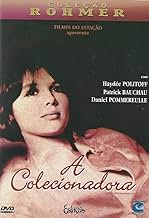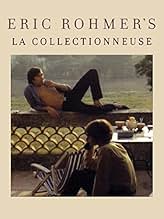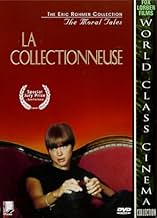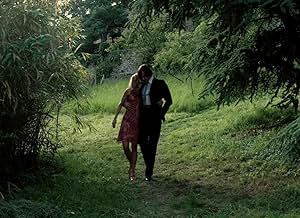VALUTAZIONE IMDb
7,3/10
10.501
LA TUA VALUTAZIONE
Un commerciante d'arte donnaiolo e un pittore vedono la serenità della loro vacanza in Riviera disturbata da una terza ospite, una vivace donna bohèmien rinomata per la sua lunga lista di sp... Leggi tuttoUn commerciante d'arte donnaiolo e un pittore vedono la serenità della loro vacanza in Riviera disturbata da una terza ospite, una vivace donna bohèmien rinomata per la sua lunga lista di spasimanti.Un commerciante d'arte donnaiolo e un pittore vedono la serenità della loro vacanza in Riviera disturbata da una terza ospite, una vivace donna bohèmien rinomata per la sua lunga lista di spasimanti.
- Regia
- Sceneggiatura
- Star
- Premi
- 2 vittorie e 1 candidatura in totale
Mijanou Bardot
- Carole
- (as Mijanou)
Eugene Archer
- Sam
- (non citato nei titoli originali)
Brian Belshaw
- Haydée's boyfriend
- (non citato nei titoli originali)
Pierre-Richard Bré
- Homme dans l'auto
- (non citato nei titoli originali)
Donald Cammell
- Garçon à St-Tropez
- (non citato nei titoli originali)
Alfred de Graff
- Touriste perdu
- (non citato nei titoli originali)
Recensioni in evidenza
Two tired cliches are that sex destroys friendships and that men and women can never really be friends and no-one chronicled these two sayings better than Eric Rohmer who made it his life's work to explore the psychological battles that we call courtship. In doing so he became, perhaps, the cinema's greatest director of women. Let's forget for a moment that he divided his films into series, (Six Moral Tales, for example, of which "La Collectionneuse" is one), and concentrate on the film at hand.
"La Collectionneuse" is very simple and very straightforward. Two male friends spend a summer sharing a villa in the south of France. There is another occupant, a slightly younger woman who sleeps around and it is she the men christen the collector since she 'collects' men wherever she goes. They, of course, consider themselves moral but they are also intellectuals and perhaps womanisers, too. They want to collect the girl; they want the girl to collect them.
Like all of Rohmer's best work this is a film of talk rather than action. Rohmer doesn't film love scenes or sex scenes; once his male and female characters enter the bedroom he loses interest. It's the chase and not the catch he cares about and whether men and women really can be friends as well as lovers. He takes his subjects seriously but he also likes to have fun at their expense and like so many of his films "La Collectionneuse" will have you chuckling if not exactly laughing out loud.
In his later films it was usually the women who took the lead but here it is Adrien, (a superb Patrick Bauchau), who acts as our narrator, guiding us through the moral maze but then all three players are excellent. This may be a minor Rohmer film but minor only in the way a short story is considered minor when compared to a novel. Personally I think "La Collectionneuse" is a Rohmer crying out for your collection.
"La Collectionneuse" is very simple and very straightforward. Two male friends spend a summer sharing a villa in the south of France. There is another occupant, a slightly younger woman who sleeps around and it is she the men christen the collector since she 'collects' men wherever she goes. They, of course, consider themselves moral but they are also intellectuals and perhaps womanisers, too. They want to collect the girl; they want the girl to collect them.
Like all of Rohmer's best work this is a film of talk rather than action. Rohmer doesn't film love scenes or sex scenes; once his male and female characters enter the bedroom he loses interest. It's the chase and not the catch he cares about and whether men and women really can be friends as well as lovers. He takes his subjects seriously but he also likes to have fun at their expense and like so many of his films "La Collectionneuse" will have you chuckling if not exactly laughing out loud.
In his later films it was usually the women who took the lead but here it is Adrien, (a superb Patrick Bauchau), who acts as our narrator, guiding us through the moral maze but then all three players are excellent. This may be a minor Rohmer film but minor only in the way a short story is considered minor when compared to a novel. Personally I think "La Collectionneuse" is a Rohmer crying out for your collection.
Art dealer, in need of serenity, finds that the holiday villa is shared by a hedonistic young woman. He becomes obsessed with ignoring her and pretends to himself that she wants to seduce him while he remains unaffected. The holiday thus turns into a love triangle between the indifferent but flirtatious girl, the man's unacknowledged desire, and his incessant, pompous self-rationalizations (the best cinematic use of voice-over EVER!). A sunny, witty, and deeply ironic "moral tale" that explores, like most of Rohmer's work, the uneasy vacillation between intellect and eroticism.
10totius
It's hard to explain what is the Rohmer's cinema. In his movies you can't find heroes, incredible adventures or great action sequences. Everything happens inside the mind of the characters, and the most important aspect is the psychology of them.
La Collectioneuse is simply the masterpiece of Rohmer.
The plot is very simple: two boys and one girl in their friend's house in St.Tropez. That's all. There are not incredible events that happen, they simply LIVE there. It's an typical situation of Rohmer who likes to study the evolution of love triangles, in different situations. The explanation of the development steps, made by the usual interior voice of the main character (Adrien), it's incredibly accurate and likely. It's fantastic that sometimes Adrien's thoughts look at first to be absurd, but even in this case if we reflect a bit to that we can realize that it's true, that really in similar cases we have non-sense thoughts like those. In this way, Rohmer is unique: the psycho-evolution of the characters is incredibly real. Dialogs, internal and not, are superb and the directing essential.
Rohmer shows us how it's possible to make a masterpiece with a ridiculous budget, and how an intellectual movie can be also enjoyable and not so heavy.
The vote, of course, can't be different by 10 out of 10.
La Collectioneuse is simply the masterpiece of Rohmer.
The plot is very simple: two boys and one girl in their friend's house in St.Tropez. That's all. There are not incredible events that happen, they simply LIVE there. It's an typical situation of Rohmer who likes to study the evolution of love triangles, in different situations. The explanation of the development steps, made by the usual interior voice of the main character (Adrien), it's incredibly accurate and likely. It's fantastic that sometimes Adrien's thoughts look at first to be absurd, but even in this case if we reflect a bit to that we can realize that it's true, that really in similar cases we have non-sense thoughts like those. In this way, Rohmer is unique: the psycho-evolution of the characters is incredibly real. Dialogs, internal and not, are superb and the directing essential.
Rohmer shows us how it's possible to make a masterpiece with a ridiculous budget, and how an intellectual movie can be also enjoyable and not so heavy.
The vote, of course, can't be different by 10 out of 10.
The first feature length moral tale, La Collectionneuse is easily better than its predecessors. Offering a realistic look into the lives of three young people and narrated perfectly by one, La Collectionneuse is a beautiful film. This is Eric Rohmer's first color feature and it is absolutely magnificent to look at. There are several gorgeous beach scenes. The cinematography all around is just glorious. Aside from that, the acting is wonderful. There is so much chemistry between the main characters that it electrifies the film. It also provides a realistic tale of the struggle to keep morality. Translated as "The Collector" in English, La Collectionneuse is an overlooked, underrated film that should be considered a classic.
The story begins with three prologues. The first, Haydee's prologue, simply shows the girl on the beach in a skimpy bikini. The second prologue introduces the viewer to Daniel, a painter, who becomes a key character. Adrien's prologue, the third and last, gives us an introduction to Adrien, who becomes our narrator throughout the rest of the film. These three characters are whom the story revolves around. Sharing a mutual friend, the three of them come to share a villa during their vacation. Adrien, an art dealer who is played by Patrick Bauchau, has made it his goal to do absolutely nothing during his stay. He and Daniel (Daniel Pommereulle) become friends fairly quickly, but both keep their distance from Haydee (Haydee Politoff), the beautiful young girl who beds a different guy every night. Adrien is at first disgusted with her behavior, calling her a "collector" of men, but eventually becomes intrigued by her. As he grows more and more attracted to her, Adrien must decide whether or not to sleep with her and forget his moral integrity or to abstain and do what he knows is right. Through his narration, Adrien debates this and plays mind games with Haydee, although he's not sure if she shares the attraction or if she simply wants to add him to her collection.
This film is simply beautiful. The sexual tension feels very real, which is due to both the performances of the actors and the direction of Eric Rohmer, who is quickly becoming one of my favorite directors. The narration is refreshing, offering a good look into Adrien's mind. La Collectionneuse is very sharp with its dialogue and themes. Like the other Rohmer films I've seen, this one ends very abruptly. It reminds us that we're watching these people's lives for only a short time. The 87 minutes is completely worth it, though. La Collectionneuse is a great film and should be regarded in higher esteem than it seems to be. I can't imagine why this one isn't ranked alongside the greats.
10/10
The story begins with three prologues. The first, Haydee's prologue, simply shows the girl on the beach in a skimpy bikini. The second prologue introduces the viewer to Daniel, a painter, who becomes a key character. Adrien's prologue, the third and last, gives us an introduction to Adrien, who becomes our narrator throughout the rest of the film. These three characters are whom the story revolves around. Sharing a mutual friend, the three of them come to share a villa during their vacation. Adrien, an art dealer who is played by Patrick Bauchau, has made it his goal to do absolutely nothing during his stay. He and Daniel (Daniel Pommereulle) become friends fairly quickly, but both keep their distance from Haydee (Haydee Politoff), the beautiful young girl who beds a different guy every night. Adrien is at first disgusted with her behavior, calling her a "collector" of men, but eventually becomes intrigued by her. As he grows more and more attracted to her, Adrien must decide whether or not to sleep with her and forget his moral integrity or to abstain and do what he knows is right. Through his narration, Adrien debates this and plays mind games with Haydee, although he's not sure if she shares the attraction or if she simply wants to add him to her collection.
This film is simply beautiful. The sexual tension feels very real, which is due to both the performances of the actors and the direction of Eric Rohmer, who is quickly becoming one of my favorite directors. The narration is refreshing, offering a good look into Adrien's mind. La Collectionneuse is very sharp with its dialogue and themes. Like the other Rohmer films I've seen, this one ends very abruptly. It reminds us that we're watching these people's lives for only a short time. The 87 minutes is completely worth it, though. La Collectionneuse is a great film and should be regarded in higher esteem than it seems to be. I can't imagine why this one isn't ranked alongside the greats.
10/10
La Collectionneuse is a fine example how consistent Eric Rohmer was throughout his Moral Tales series. The story isn't important here, its the intensity of each scene and the tension among the characters till the last scene. Subtle jump cuts in the storyline can make you pause & arrive at your own hypotheses about how the characters are feeling in the following scenes. This is a visual treat - whether its the sights & sounds of the reviera house where most of the movie takes place, or the shots of beach or Haydee Politoff's delicious lips. You never begin to hate or love any character at any point - but they stay on your mind long after the movie is over. The characters, adrian, haydee & daniel exude human rawness - none are perfect or simplistic. As a viewer, I could not take anyone's side. They all seek power in their own ways, while exposing their sensitivies equally. Its a curious caricature of the complexities around love and life. Rohmer uses symbols like antiques to express how the relationships are built and broken. I could watch it again & again. A delightful Rohmer classic - its poetic, with a pacing that works as a meditation of sorts.
Lo sapevi?
- QuizÉric Rohmer's first color film.
- ConnessioniFeatured in Uuden aallon jäljillä (2009)
I più visti
Accedi per valutare e creare un elenco di titoli salvati per ottenere consigli personalizzati
Dettagli
- Data di uscita
- Paese di origine
- Sito ufficiale
- Lingue
- Celebre anche come
- The Collector
- Luoghi delle riprese
- Côte d'Azur, Francia(coastal line and landscapes)
- Aziende produttrici
- Vedi altri crediti dell’azienda su IMDbPro
Botteghino
- Lordo in tutto il mondo
- 7077 USD
- Tempo di esecuzione
- 1h 26min(86 min)
- Mix di suoni
- Proporzioni
- 1.37 : 1
Contribuisci a questa pagina
Suggerisci una modifica o aggiungi i contenuti mancanti

![Guarda Bande-annonce [OV]](https://m.media-amazon.com/images/M/MV5BMjA2ZGRjY2QtNmMzMy00MjE3LWI1YzUtZTZiZDQ5YzY0YWIxXkEyXkFqcGdeQXRyYW5zY29kZS13b3JrZmxvdw@@._V1_QL75_UX500_CR0)

























